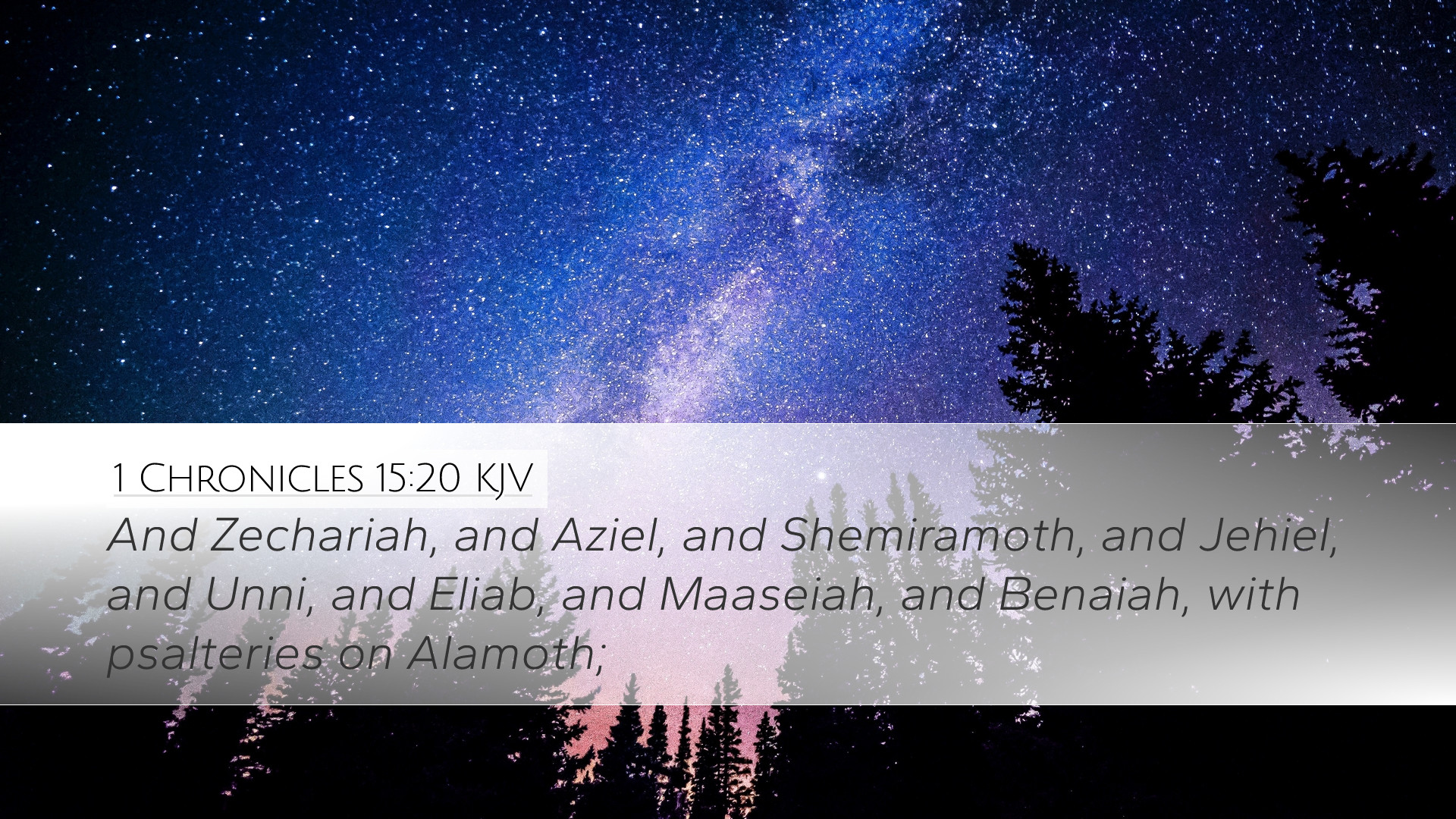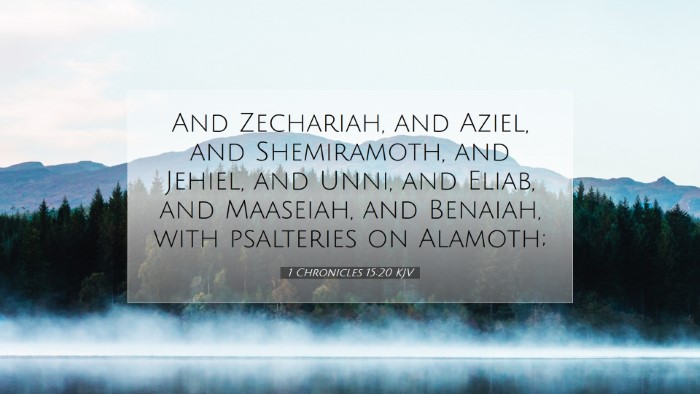Commentary on 1 Chronicles 15:20
Verse Text: "And David appointed certain of the Levites to minister before the ark of the LORD, and to record, and to thank and praise the LORD God of Israel: 1 Chronicles 15:20."
Introduction
This verse marks a significant moment in the history of Israel, where David is seen taking steps to properly honor the ark of the covenant after its return to Jerusalem. The organization of worship and the role of the Levites in this process are central to understanding the text.
Context of the Passage
David’s actions reflect a deep concern for the proper worship of Yahweh, which had been neglected during Saul's reign. This restoration of worship is critical as it emphasizes the importance of reverence and order in the service of God.
Insights from Matthew Henry
Matthew Henry highlights that David’s appointment of Levites to minister before the ark underscores the necessity of divinely appointed leadership in worship. Henry notes that the Levites had a sacred duty to engage in the spiritual activities associated with the ark, which represented God's presence among His people.
- The Role of Levites: Henry elaborates that the Levites were chosen not only for their lineage but also for their readiness to serve. Their duties included recording events, giving thanks, and offering praise, indicating a multifaceted ministry.
- Worship as Central: He emphasizes that worship is at the center of the nation's life and that these appointed tasks were critical for maintaining the spiritual health of Israel.
- Thanksgiving and Praise: The act of giving thanks and praise reflects an attitude of gratitude that is essential in approaching God.
Insights from Albert Barnes
Albert Barnes provides additional depth to the function of the Levites in this context. He remarks on the structured approach that David implemented, which involved a clear division of responsibilities among the Levites.
- Systematic Worship: Barnes points out that the organization into specific tasks demonstrates the need for a systematic approach to worship, which contributes to a more profound experience of God's presence.
- Liturgical Significance: He notes that such arrangements in worship not only honor God but also educate the people, as they witness and participate in properly formatted worship.
- Community Aspect: This structured worship signifies the community’s involvement, reminding that worship is not merely an individual act but a collective experience within the body of believers.
Insights from Adam Clarke
Adam Clarke adds a theological dimension by discussing the implications of the ark's presence in worship. He considers the historical context and the significance of the ark being among God’s people.
- Symbol of God's Presence: Clarke notes that the ark signifies God's covenant with Israel, making the Levites' role even more critical as they facilitated the relationship between God and His people.
- Worship in Spirit and Truth: He argues that the Levites' service exemplifies the idea of worshiping God in spirit and truth, echoing Jesus' teaching in John 4:24.
- Spiritual Legacy: Clarke concludes by emphasizing that the meticulous organization of worship laid down by David and the Levites has a lasting legacy that influences worship practices in both the Old and New Testament contexts.
Theological Reflections
In summary, 1 Chronicles 15:20 provides a rich tapestry of insight regarding worship and service within the community of faith. The use of the Levites as appointed ministers shows God's desire for order and reverence in worship. The roles established reflect a theology of service and gratitude that resonates through generations.
Practical Application for Pastors and Theologians
This passage offers essential lessons for modern-day worship leaders and theologians:
- Structured Worship: Consider how structure in worship can facilitate a deeper engagement with God.
- Involvement of the Congregation: Encourage active participation among church members, akin to the communal worship witnessed in ancient Israel.
- Gratitude as Central to Worship: Foster a culture of thanksgiving and praise in church settings, reminding congregants of the importance of expressing gratitude to God.
- Education through Worship: Utilize the liturgy to educate the congregation about the significance of worship, much like the Levites did.
Conclusion
1 Chronicles 15:20 exemplifies the vital connection between faith, worship, and community. As believers reflect on this passage, they are reminded of the importance of structured, reverent worship that engages the entire community, centering on thanksgiving and praise to God. The insights derived from the revered commentaries serve to deepen our understanding of these timeless truths.


